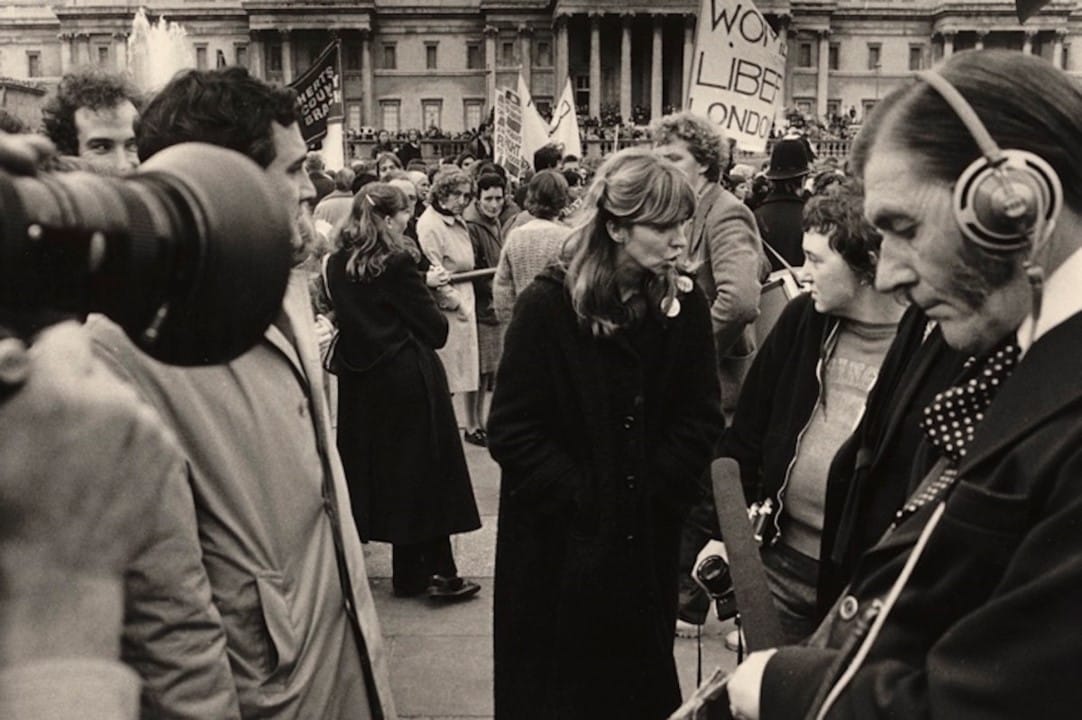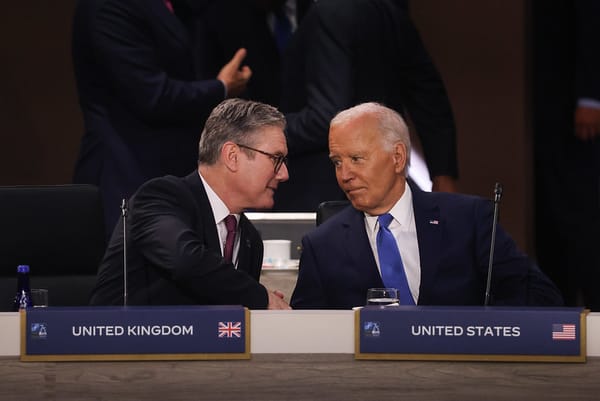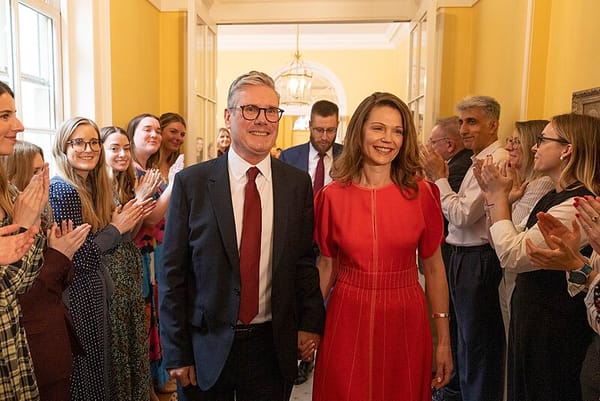The lost archive: Finding Jewish feminism
The Jewish feminist movement in the UK has left a complicated and contested legacy.

In 1982, a sixty-something-year-old Rita Altman sat in her London home speaking to a younger feminist activist, while a tape recorder whirred away between them. She recounted how she had fled the Holocaust in her teens, moving first from Łódź in Poland to Germany and then to London. By 1960, she was working as a hairdresser in Soho, inventing hairstyles that ended up all over the “glossies” of mid-century Britain. Reflecting, Rita mused, “I think it’s a duty, especially in this century, for Jews to know their history.” She turned to the young woman opposite her, projecting her directive into the future: “You have to understand your past to know what is being asked of you.”
Memory politics play an outsized role in the modern Jewish zeitgeist. Outside of the highly publicised debates on Holocaust memorialisation, Anglo-Jewish identity remains rooted in popular history, dominated by model-minority narratives of upward mobility. Recently, however, the history of the Jewish left has increasingly been afforded attention, offering an alternative lens on the Jewish past. Publications like Revolutionary Yiddishland in English translation have put the Bund on the radar for another generation, while the Battle of Cable Street has enjoyed a new-found glory as a celebrated moment of Jewish anti-fascism.
Through this resurrection of Jewish history, there is one episode that continues to be neglected, deemed unworthy of salvaging by both the mainstream Jewish establishment and the radical Jewish left. This is the complicated legacy of the Jewish Women’s Liberation Movement (WLM) – hereafter Jewish feminism – which came into fruition in the early 1980s and receded into oblivion not long after.
The source of Rita Altman’s interview, Generations of Memories, was born and died in this Jewish feminist milieu. Published in 1984 by feminist collective the Jewish Women in London Group (JWILG), Generations of Memories was a collection of interviews with London-based Jewish women all born before 1945. It represents only a small fraction of the oral histories recorded by JWILG over its lifespan. The group, like the movement of which it was a part, has received minimal attention from historians. Meanwhile, the transcripts of the interviews they recorded have since been misplaced and lost to history. Rita’s voice, along with those of nearly 50 others, is degrading somewhere on an old roll of tape.
The Jewish feminist breakaway
In the early 1980s, the JWILG were part of a wider Jewish breakaway from the Women’s Liberation Movement following a controversy that erupted in Spare Rib, Britain’s most widely read feminist magazine. In a 1982 article written in response to Israel’s war on Lebanon, a member of the magazine’s editorial argued that Zionism was inherently anti-feminist. An Israeli anti-Zionist activist interviewed in the piece claimed that early Zionist leaders believed that Jewish people “should thank Hitler” for the founding of the Jewish state.
Many Jewish readers were angered by the article and wrote to Spare Rib critiquing its tone and politics. Despite a long-established tradition of publishing reader responses, the magazine refused to publish the complaints. Shortly after, a Jewish women’s meeting on antisemitism was picketed by a Palestine solidarity group, deepening feelings that Jewish concerns were being drowned out by anti-Zionism. Writing about these events in a pamphlet called A Word in Edgeways in 1988, a group of left-wing Jewish women claimed that Jews had been “systematically silenced”.
Jewish women had been organising autonomously within the WLM since the late 1970s, but the rupture caused by the Spare Rib debate prompted something akin to an exodus from the mainstream movement. In 1984, the first national conference on Jewish feminism was held in London. Soon after, Shifra, a Jewish feminist periodical, was launched. It included articles on a range of subjects, from Jewish history to Jewish lesbianism, to life as a Black Jewish woman.
Shifra’s editorial team articulated a liberal Zionist position, writing: “We defend the right of Jews to a homeland. We do not believe this should be at the expense of the Palestinian people.” However, anti-Zionist Jewish women were also included in the Jewish feminist breakaway. For example, the London Jewish Feminist Group complained: “When we say we experience anti-Semitism, we are dismissed as Zionist even if we are not.” Others resented the expectation they felt was placed on them to express a “pro” or “anti” stance. Erica Burman, writing for A Word in Edgeways, stated: “I don’t see why I should be pressed into making statements as a condition for asserting my identity as a Jewish feminist.” As Shifra’s editors joked, they were 10 women with “at least eleven opinions”, but a feeling that feminist anti-Zionism had veered into antisemitism was widespread.
Interestingly, most Jewish feminists were eager to situate themselves in the lineage of “Third World feminism”, as it was then known. One Shifra contributor described the aftermath of the Spare Rib debacle: “Jewish, Black and Third World women took the brunt of the abuse and pain.” Centrally, Jewish women’s ability to organise around ethnic identity depended on a model of antiracism championed by Third World feminism. The oft-cited founding text of this shift comes from the US-based Black feminists of the Combahee River Collective, who coined the term “identity politics” as part of a critique of white feminism.
However, as long as the Jewish feminist movement remained ambivalent on the subject of Israel, it could not claim allegiance with Third World feminists writ large. As an anti-colonial ideology, Third World feminism fundamentally opposed Zionism, causing tensions between the Jewish feminist vision and practice. In addition, some Third World feminists felt uncomfortable with Jewish women utilising the language of anti-racism as a majority white group. As one woman wrote to the London Women’s Liberation Newsletter: “I am extremely angry as an Arab woman, at the London Jewish Feminist Group trying to get in on the Anti-Racist debate.”
An identity in crisis
As a result of these concerns, Jewish feminists found themselves increasingly out of place within the WLM and, in search of a community, many felt the desire to recuperate their identity as Jews. As socialists, lesbians and dissidents in more ways than one, many of them had long felt ostracised from the mainstream of the Jewish community. At the time, Julia Bard spoke of “a sense of alienation from Jewish life” felt by many Jewish radicals. Nonetheless, in the aftermath of the Spare Rib debate, many described their Jewishness as being thrown into sharp definition.
Having been sublimated for so long, however, this feeling of Jewishness was confused, and Jewish feminists were caught in a kind of collective identity crisis. For the JWILG, this prompted a turn to the past: “We had excluded ourselves from our Jewishness … this led us, as Jewish women, towards exploring our own history.”
On the one hand, this historical turn was consistent with broader trends in the WLM. Other oral history projects were taking place at the same time, such as the gay and lesbian Hall Carpenter Archives, which, like the JWILG, had received funding from the Greater London Council. However, both its critics and its champions saw Jewish feminism as having a particular relationship to the past.
In 1987, Jenny Bourne, a Jewish woman and feminist, penned a diatribe against the emergent Jewish feminist movement. Bourne’s critiques were coupled with a broader attack on the emergent politics of identity. Centring the economic and structural racism faced by other groups, Bourne claimed that Jewish feminism’s interest in history was an effort to side-step the urgency of denouncing Zionism in the present.
Bourne’s critique was harsh, but even women more sympathetic to Jewish feminism problematised its relationship to history and identity. Some feminists who had been raised Orthodox, for example, felt uneasy with others reviving religious practices they’d rejected. As Dena Attar wrote in Shifra’s second volume: ‘‘There is a difference between asserting who we are and trying to recreate who we no longer are.”
Meanwhile, the JWILG felt that engaging with the history of Jewish oppression could be a means of forging a newly political Jewish feminist identity. They hoped to draw “links with other ethnic minority groups in this country.” More than this, they set out to write a canon of Jewish feminism that could form the basis for future radical organising.
Of the eight interviews chosen for publication in Generations of Memories, Ruth, Rose and Asphodel had all been Communist Party members; Ena was a trade unionist; Elli was a campaigner for nuclear disarmament; and Maya was a lesbian feminist activist. Many of the interviewees describe a process of redefining their Judaism in terms of their feminist values. For example, Ruth, when discussing her children’s identification with the oppressed, states: “Their Jewishness has worked in that sense.” For her, the very purpose of Jewishness was to relate one’s own history to ongoing injustice.
A new way of doing Jewishness
The interviews are rich with reflections on Jewish identity as something in flux. One interviewee described her reconnection with Jewishness as facilitated by “the fight against racism, the attempt in education to encourage children to value their cultural roots.” We see in statements like this how the rise of identity-based organising pioneered by non-white feminisms opened the door to new ways of doing Jewishness for many women.
However, like the younger women in the Jewish feminist movement, other interviewees described their identity being redefined in far more divisive ways, some linking it to “the anti-Zionism/antisemitism debates taking place” in the WLM. Maya described her reaction to the six-day war in explicitly militaristic terms, recalling “a great onslaught of Jewish identity” as she hoped for Israel’s success. Here, generational differences are evident: socialism and Zionism, now widely seen as incompatible ideologies, were once regularly hyphenated terms – a subject deserving of greater analysis than can be afforded here, but one which these interviews may help us to understand and interrogate.
The tensions revealed by the JWILG project perhaps point to one of the reasons their archive has been forgotten. Generations of Memories was a direct product of the Jewish feminist movement and its attendant identity crises. In part because of internal tensions, the lifespan of this movement was short-lived. Shifra only released four issues, and the collapse of the Greater London Council put an end to funding for projects such as the JWILG.
Undoubtedly, Jews continue to be active in feminist organising in the UK today, and Jewish feminists like Juila Bard, Rabbi Elli Tikvah Sarah and Linda Bellos continue to shape progressive Jewish life as we know it. Nonetheless, Jewish feminism as a distinct historical movement is now little discussed, and its legacy doesn’t align neatly with contemporary political paradigms.
As young Jewish leftists have become increasingly anti-Zionist, the movement’s ambivalent stance on Israel will be unappealing to many. At the same time, where Jewish feminism articulated a genuine radicalism, this legacy has not been recuperated by mainstream Anglo-Jewish memory politics. Jewish feminism is stuck in limbo, and remains slightly out of place, with nobody fighting to defend its memory.
Arguably, though, it is the political complexity of Jewish feminism that makes it particularly worth grappling with now. The relationships between Jewishness, whiteness and Zionism continue to create political ruptures on the left. While pundits like David Baddiel have established themselves as champions of an identity politics whataboutery, leftist scholars increasingly struggle with what it means to build a Jewish identity detached from Zionism.
The recovery of left-wing Jewish memory is part of this project, as is the rise of Yiddish among young Jews. Generations of Memories, meanwhile, represents an attempt to do something similar. In its pages, multiple generations of feminists explore the contradictions in their Jewish identities: between preserving tradition and rejecting patriarchy, between modern anti-racism and Jewish nationhood, between the particular experience of Jewishness and a belief in universal humanism.
These are certainly contradictions they fail to resolve, and we may take issue with their attempts to do so at various points. Nonetheless, Jewish feminism is part of our inheritance as left-wing Jews, and an engagement with its efforts to grapple with Jewishness will make us better placed to do so differently. Indeed, it is always a losing battle to turn to history for answers, but as Rita Altman said, we must pay attention to our past if we are to make sense of the questions “being asked of [us]” in the present. For these reasons, among others, the hunt for the lost archive continues. ▼
Aleph Ross is a PhD student at the University of Birmingham writing about the history of sexuality in Britain’s Jewish community.




